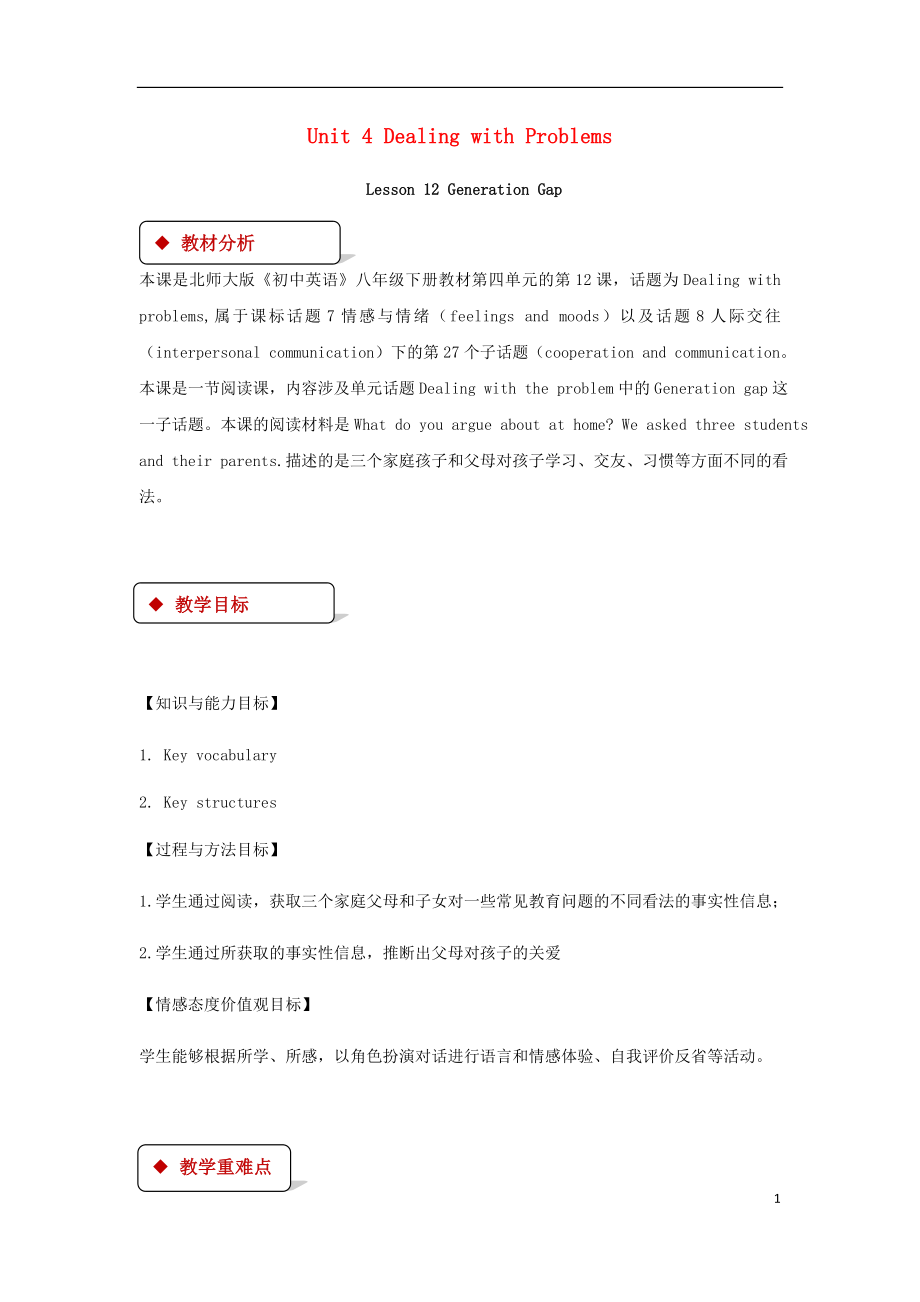《2018秋期八年級(jí)英語(yǔ)下冊(cè) Unit 4 Dealing with Problems Lesson 12 Generation Gap教案 (新版)北師大版》由會(huì)員分享����,可在線閱讀,更多相關(guān)《2018秋期八年級(jí)英語(yǔ)下冊(cè) Unit 4 Dealing with Problems Lesson 12 Generation Gap教案 (新版)北師大版(4頁(yè)珍藏版)》請(qǐng)?jiān)谘b配圖網(wǎng)上搜索���。
1�、
Unit 4 Dealing with Problems
Lesson 12 Generation Gap
◆ 教材分析
本課是北師大版《初中英語(yǔ)》八年級(jí)下冊(cè)教材第四單元的第12課���,話題為Dealing with problems,屬于課標(biāo)話題7情感與情緒(feelings and moods)以及話題8人際交往(interpersonal communication)下的第27個(gè)子話題(cooperation and communication�。本課是一節(jié)閱讀課��,內(nèi)容涉及單元話題Dealing with the problem中的Generation gap這一子話題���。本課
2���、的閱讀材料是What do you argue about at home? We asked three students and their parents.描述的是三個(gè)家庭孩子和父母對(duì)孩子學(xué)習(xí)、交友���、習(xí)慣等方面不同的看法�。
◆ 教學(xué)目標(biāo)
【知識(shí)與能力目標(biāo)】
1. Key vocabulary
2. Key structures
【過(guò)程與方法目標(biāo)】
1.學(xué)生通過(guò)閱讀����,獲取三個(gè)家庭父母和子女對(duì)一些常見教育問(wèn)題的不同看法的事實(shí)性信息;
2.學(xué)生通過(guò)所獲取的事實(shí)性信息����,推斷出父母對(duì)孩子的關(guān)愛(ài)
【情感態(tài)度價(jià)值觀目標(biāo)】
學(xué)生能夠根據(jù)所學(xué)�����、所感�,以角色扮演對(duì)話進(jìn)行語(yǔ)言和情
3���、感體驗(yàn)����、自我評(píng)價(jià)反省等活動(dòng)����。
◆ 教學(xué)重難點(diǎn)
◆
【教學(xué)重點(diǎn)】
通過(guò)聽,獲取�����、理解對(duì)話的相關(guān)信息�。
【教學(xué)難點(diǎn)】
學(xué)生通過(guò)所獲取的事實(shí)性信息,推斷出父母對(duì)孩子的關(guān)愛(ài)�。
◆ 課前準(zhǔn)備
◆
Tape recorder, Multimedia
◆ 教學(xué)過(guò)程
Step 1. Warm-up
Draw Ss’attention to the topic of the lesson by presenting the picture of their family photos by quest
4、ions:
Q1: Do you love your parents?
Q2: Do your parents love you?
Step 2 Pre-reading
1. LSs talk about what problems they always argue with their parents by presenting the survey.
2. Ss talk about their feelings when they argue with their parents by questions:
Q1: When you argue with your pare
5��、nts, are you happy?
Q2: Are you parents happy?
3. Ss think why we always argue with our parents by answering questions
Q1: What kind of family life would you like to live?
Q2: Why do you sometimes argue?
Step 3. Reading
Part 1
1. Read for the general information.
Ss read quickly to guess wha
6�����、t might be in a passage by reading the pictures, title and the bold words to encourage Ss to
Ss are trained fast reading skills by the key words with the help of questions.
Q1: Who are three students?
Q2: Who are three parents?
Ss re-construct the structure of passage with the help of questions
7�����、.
Q1: Which part are the students talking about?
Q2: Which part are the parents talking about?
2. Read for the detailed information.
Part 2
1. Ss get and understand the detailed information with the help of the questions.
Q1:What problems do they argue with their parents?
2. Ss check the answ
8��、ers by presenting it on PPT.
3. Ss share how they feel their parents with the help of questions.
Q1: Do you have the same problem like theirs?
Q2: When your parents argue about these things with you , how do you feel?
Q3: How about the three students?
Q4: Are they satisfied with their parents?
9�、
Q5: What do they think of their parents?
Step 4. Work in pairs
1 Work with your partner to recall (回憶)the problems and suggestions.
2.Ss understand the task by reading the report
A lot of teenage students have some problems with their parents. Andy, Jessica, Edward showed their problems in our text book. Would you like to help some of them?
Step 5 Homework
1. Read the text carefully.
2. Design your own Problem Page
◆ 教學(xué)反思
略�����。
4
 2018秋期八年級(jí)英語(yǔ)下冊(cè) Unit 4 Dealing with Problems Lesson 12 Generation Gap教案 (新版)北師大版
2018秋期八年級(jí)英語(yǔ)下冊(cè) Unit 4 Dealing with Problems Lesson 12 Generation Gap教案 (新版)北師大版

